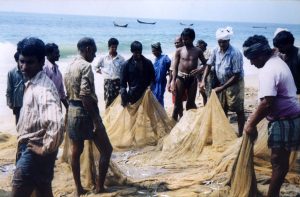The second Small-scale Fisheries Summit, held in Rome just like the first one 40 years ago, reverberated with resounding calls for the implementation of the SSF Guidelines
This article is by Pradip Chatterjee (pradipdisha@gmail.com), President, National Federation of Small-scale Fishworkers (NFSW), India
The second Small-scale Fisheries (SSF) Summit, held at the headquarters of the Food and Agriculture Organization of the United Nations (FAO) in Rome, Italy, was a grand event that brought together 285 people, primarily representatives of SSF organizations and their supporters, but also inter-governmental organizations, academics, non-governmental organizations (NGOs) and governments. A total of 78 countries were represented at the event organized on July 5-7, 2024. The Summit Hall at the FAO headquarters was a confluence of colours and cultures of five continents; It reverberated with a bewildering variety of issues presented by SSF representatives from across the world.
John Kurien’s presentation on the history of the Summit commemorated the tenth anniversary of the Voluntary Guidelines for Securing Sustainable Small-scale Fisheries in the Context of Food Security and Poverty Eradication (the SSF Guidelines). It was brilliant, informative and enlightening. Gender representation was more or less even, with 49 per cent female and 51 per cent male. But the situation was different when considered by geography and by nature of organizations represented. Asia, by far the largest fish-producing continent in the world, had only 12 per cent participation. SSF member-based organizations, which actually represent the small-scale fishworkers, had less than 40 per cent participation. Given the sorry state of global inland fisheries, especially inland capture fisheries, their voice should have been more prominently heard at the Summit.
Though customary tenure rights and social development in SSF were the two priority topics, implementation of the SSF Guidelines was also discussed with much interest. The discussion on customary tenure rights was rich in content and covered large variations in the nature of tenure rights needed by small-scale fishers and fish farmers. But the need to include protection of water and fish resources in tenure rights was not mentioned with the importance it deserved.
The imperative to protect the livelihood rights of SSF communities in protected or conservation areas was reiterated by a number of participants
Another point relating to customary tenure rights in SSF came up in response to a plenary presentation on mapping of various conservation projects by the representative of Conservation International, an international environmental NGO. Voices from the floor were raised on the need to include mapping of conflict zones between conservation groups and SSF communities. The imperative to protect the livelihood rights of SSF communities in protected or conservation areas was reiterated by a number of participants.
The discussions on social development saw multiple references to the need for alternative livelihood sources. For small-scale fishworkers, this means working in sectors other than fisheries. This is not acceptable because it changes their identity as workers who live off fisheries. Fishing communities may need additional livelihood options to complement their earnings from fisheries, but they will never abandon their fishing work.
It was only appropriate that the call for ‘alternative livelihood’ was challenged on the floor and found resounding support.

During the discussions on the SSF Guidelines, it was mentioned that FAO should not only push for their implementation but also monitor it, producing periodic country reports on the status of execution, a kind of report card. If done, this would immensely help the SSF communities in their struggle to make their respective governments accountable.
The Summit vociferously and unanimously claimed the right to participate in the Committee on Fisheries (COFI), FAO Council’s subsidiary body that is the only global inter-governmental forum where FAO members meet to consider issues related to fisheries and aquaculture. COFI provides periodic global recommendations and policy advice to governments, regional fishery bodies, civil society organizations, and actors from the private sector and international community. “Nothing for us without us” was the resounding clamour at the Summit. It was felt that the SSF organizations should have a permanent international hub at FAO to co-ordinate among themselves and make timely interventions on critical issues. This would help oversee the process of implementation of the SSF Guidelines.
Save Water, Save Fish, Save Fisher People…
Small-scale Fishworkers of the World, Unite!
For more
National Federation of Small-scale Fishworkers
https://smallscalefishworkers.org/small-scale-fish-worker-organisations/national-platform-for-small-scale-fish-workers-inland/
“Customary tenure rights and social development should be at the heart of small-scale fisheries governance”: A reflection on the 2nd FAO Small-scale Fisheries Summit
https://pureportal.strath.ac.uk/en/publications/customary-tenure-rights-and-social-development-should-be-at-the-h